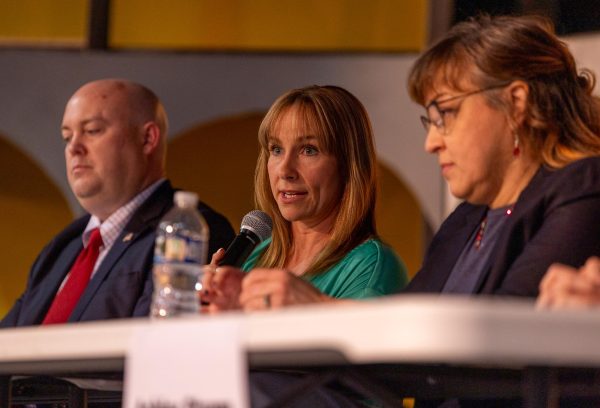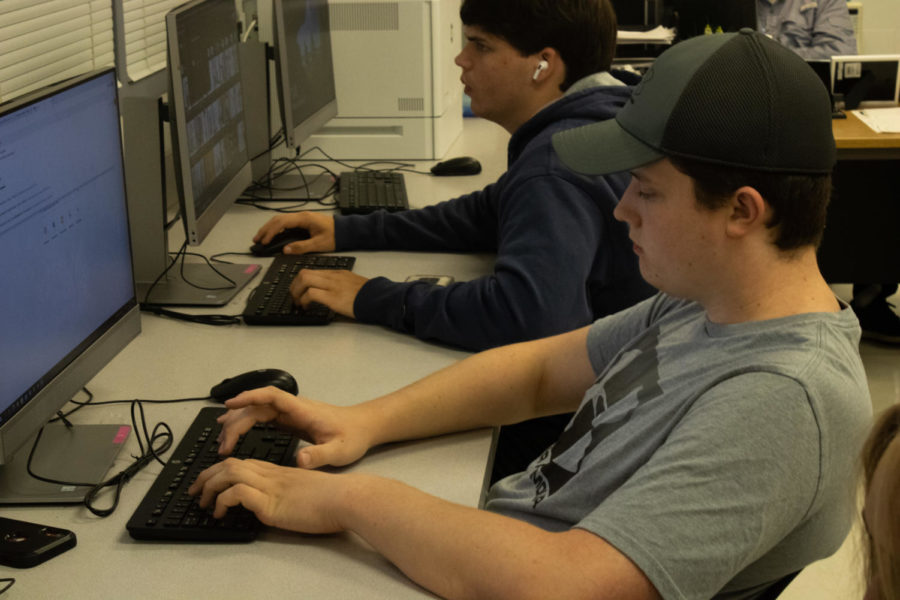Feeling the Pinch
Teens with job experiencing real world issues in work force
Working on an assignment in Business Entrepreneurship, senior Jacob Dupre completes classwork for Mrs. Shannon Carlson’s class. Dupre’s job at Home Depot has exposed him to some of difficulties teen members of the work force experience, such as understaffing and new hires being paid more than existing employees.
Whether it be pressure for a parent or guardian, wanting the freedom of your own income, or just an excuse to get out of the house, high school students are no strangers to the world of part-time jobs. Whatever the reason, a job can be hard to manage for students, and with that understanding, it’s proven hard for big corporations and their management teams to remember that the student workers are just that: students.
While work can be a big part of a student’s life, particularly college-bound upperclassmen, it can be hard to keep a genuine source of income for young workers, and the myriad of reasons only keeps growing larger, according to senior Jacob Dupre.
“[Gas is] actually pretty much a lot of my paycheck, because I’m spending like $40-60 on gas every week to week-and-a-half and I only have a 15-gallon tank,” Dupre said.
Dupre started his first and only job at Home Depot about a year ago. While he has enjoyed working there, he and his coworkers have experienced their fair share of pay gaps compared to new hires.
“Well, I feel like, because we are still — we used to be short staffed — not as much anymore, but the pay is sort of unfair…[Management] used to bring on new hires on and have them paid more than the rest of us, who have been working there way longer,” Dupre said. “So new hires would be starting at like $14, while the rest of us are still at $12. So, like, the pay was sort of uneven up until they switched some things around.”
While this experience may be fairly specific to Dupre, there are other people, such as senior Leia Daughhetee who have faced the difficulties of uncompromising economic inflation and the smothering weight of expectations from themselves and others. Daughhetee has been working at MOD Pizza for about a year now, and finding herself a part-time worker in the age of low-employment rates, she hasn’t had an easy time of making a cohesive work schedule.
“Every little penny counts. Like every dollar that I get for college is one less dollar in student loans to pay off later in life…
“We were just totally closed out, like, the whole day [last week] on Tuesday, because there’s not enough people and a lot of people have quit, I mean, so that adds to it. My schedule has been all kinds of crazy. I don’t have very consistent hours because sometimes they’ll schedule me more or less,” Daughhetee said. “[But] I need certain hours for the work program, right? So in order to pass the class, I need to have certain hours, and if my boss isn’t doing that for me, then I don’t get to pass.”
While the current distribution of work-hours has proven difficult for Daughhetee, she isn’t the only one struggling with the current underemployment crisis. Jayden Geirer, a senior and professional special needs facilitator at Vacation Station. Geirer’s job typically consists of administering guidance and care to her assigned charge. However, due to understaffing at her location, and the unavailability of other workers, Geirer has been forced to sacrifice her and her student’s time by taking on the care of additional children, as well.
“We’re really understaffed, so I’m scheduled a lot more than I should be and the kid I work with can be physical, and sometimes that behavior can affect the other children,” Geirer said. “So, that’s when it has the potential to become a dangerous environment, which we can’t do anything about, because not many of our remaining employees are qualified to work with our special needs kids.”
With all of this accumulating into our current economic crisis of the simultaneous surplus of open positions, not enough jobs, and steadily rising income taxes, Daughhetee finds it hard to describe what it’s been like to navigate this environment.
Your donation will support the student journalists of Francis Howell Central High School. Your contribution will allow us to purchase equipment and cover our annual website hosting costs. FHCToday.com and our subsequent publications are dedicated to the students by the students. We hope you consider donating to allow us to continue our mission of a connected and well-informed student body.






